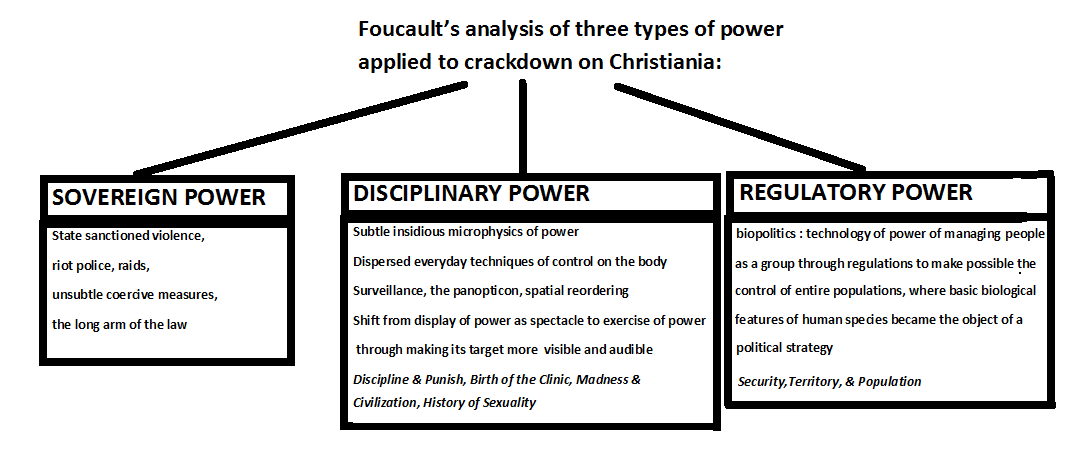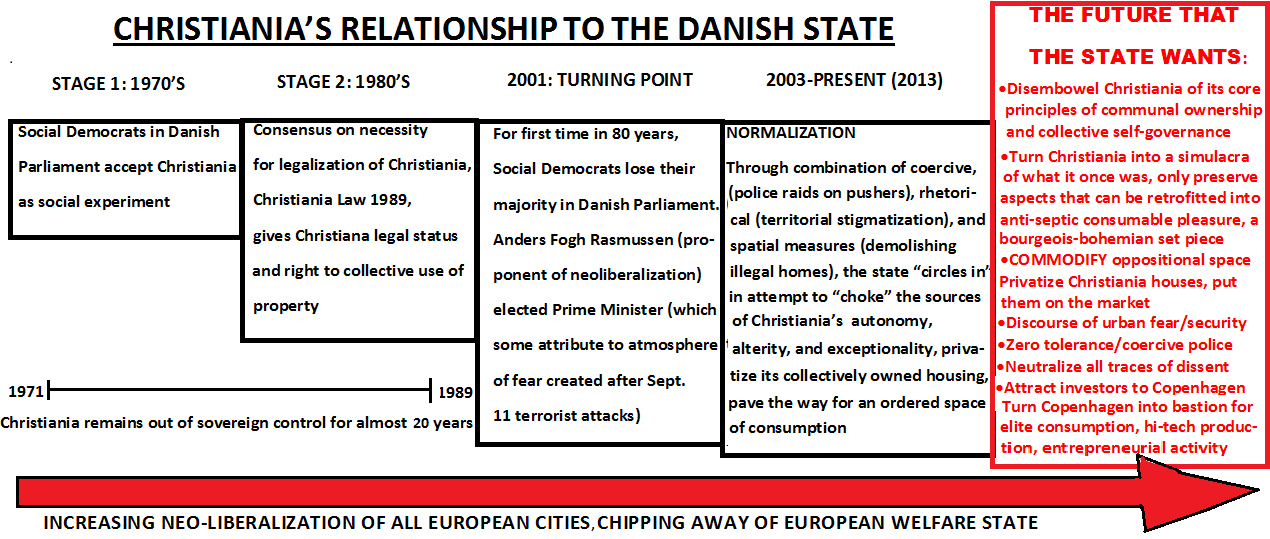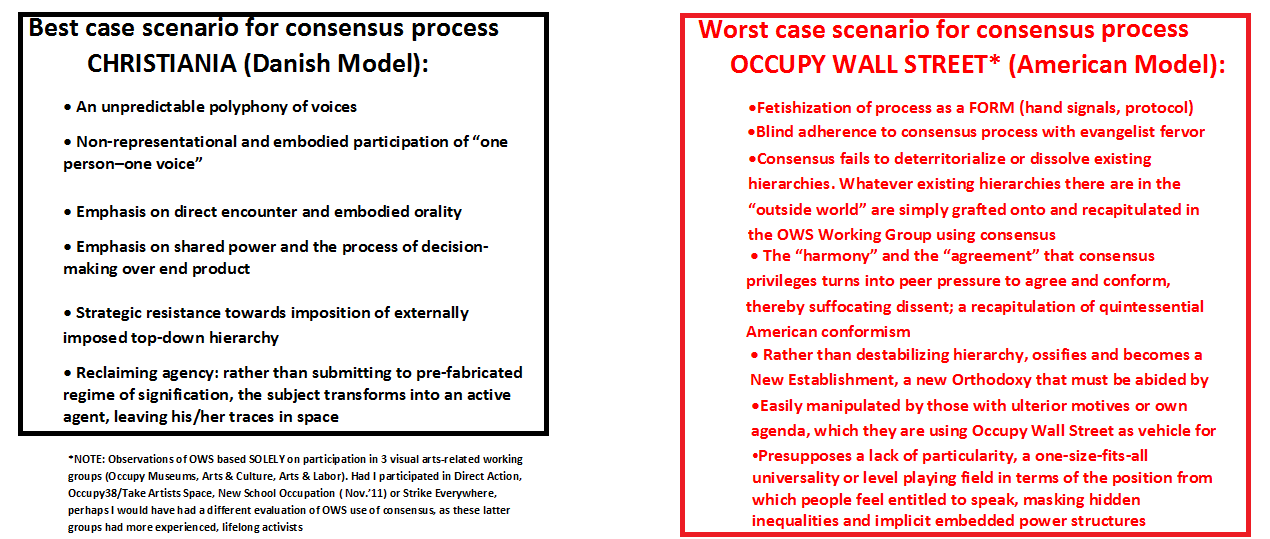Andrea Liu/THE NAXAL BELT IN CHRISTIANIA

Part I: The Production of Neoliberal Spatiality
Borne out of a violation of Danish law and continuing for 42 years in state of experimental legitimacy, Christiania is a squatter community “Free State” in the middle of Copenhagen, a “Temporary Autonomous Zone” known for its rejection of private property ownership, its creative appropriation of empty spaces, consensus-based self-governance, and ethos of mutual aid. Operating as a countervailing social and political imaginary. Christiania was accepted as a social experiment by the Social Democrats for 20 years, but has been under increasing pressure to “normalize” since the rightward turn in Danish government in 2001.
Following the crackdown on Christiania from the Anders Fogh Rasmussen regime in 2003 and increasing pressure to disembowel Christiania of its core principles through privatization of collectively owned buildings, my research at CRIR looks at how we can use the Normalization push on Christiania to look at how government is performed through the Foucauldian tripartite of sovereign, disciplinary and regulatory power as suggested by Hakan Thorn in Space for Urban Alternatives? Christiania 1971-2011. Sovereign power can be characterized as state-sanctioned violence, police, display of power as spectacle, and coercion; disciplinary power as a more subtle, insidious microphysics of power and dispersed quotidian techniques of control on an individual and his/her body; regulatory power as biopolitics or a macro-technology of power of managing people as a group to make possible the control of entire populations, where the basic biological features of the human species became the object of a political strategy.
Above all, I am also interested in researching the ideological operations embedded in the rhetorical strategies of the state to reproduce neoliberal spatiality. The study put out by the state in 2004 The Christiania Area’s Future: Master Plan and Action Plan advocating for normalization was followed by the onslaught of the“Creative Copenhagen” state campaign to repackage the city space by marketing an image of Copenhagen’s entrepreneurial creativity for elite consumption and hi-tech production. Using Rosalyn Deutsche’s deconstruction of the modernist tendency to obscure political conflicts by appeals to ideal form embedded in the rhetoric of New Urban Art to justify the privatization of NYC’s Union Square in Evictions: Art and Spatial Politics, I am interested in demystifying the rhetorical strategies of the Danish state to conjure up chimeras of social space as a pre-formed unity that precedes representation that must be protected from “conflict” (i.e. dissent or challenge to private property norms) and “opened up” (i.e. privatized) in order to evict Christiania residents.
Who has the right to the city and why? How can Christiania as an oppositional oasis in a sea of neoliberal make-over be compared with the squatting and seizing of a corporate-owned empty building by Isola Art Center (Milan), the rejection of the hyper-aestheticization of public space by the Sculpturenpark project (Berlin), and Teddy Cruz’s displacement of selfish urbanization with hybrid use and scavenger economy (San Diego, California)? This project will culminate in a discussion in collaboration with University of Copenhagen/Erasmus Project students and artists from ZK/U-Berlin (Center for Art and Urbanistics).
KEYWORDS: Neoliberal Spatiality/ Neoliberal Imaginary/ Redlining /Blockbusting/ Territorial Stigmatization/ Space Wars/Aesthetics of Tactical Formlessness/ Critical Publicness/Critical Urban Theory/Neoliberalism as Creative Destruction/Accumulation by Dispossession (David Harvey)/ Temporary Autonomous Zone (Hakim Bey)
Andrea Liu is New York City-based visual art and dance critic, and dancer who just completed two artist residencies in Berlin (ZK/U and Culturia). She was founder of the temporary gallery The Naxal Belt in Brooklyn, NY.
http://replaceandrea.blogspot.com
http://naxalbelt.blogspot.com
www.zku-berlin.org

Part II Consensus: Cooperation & Conformity
As artist-in-residence at CRIR I would like to observe and synthesize how consensus process functions within the Christiania community and the tension between cooperation and conformity. As an active member of Occupy Wall Street in 2011 and 2012, Zuccotti Park was a singular unrepeatable moment in time: a living social sculpture, an improvisational micro-utopia, a miniature society made from scratch. Consensus process, a mode of group decision-making that emphasizes shared power and the process of decision-making over product, was central to our movement (some might say to the point of being fetishized). Rather than voting and having a “winner” and “loser”, it is a slow painstaking process with many steps of incremental negotiation aimed at guaranteeing a polyphony of voices and resistance to externally imposed top-down hierarchy. However, in Occupy Wall Street the “harmony” and the “agreement” that consensus privileges can be a conservative anesthesia that peer pressures people to conform and stigmatizes dissent. For Gramsci, consensus was an insidious result of the ruling class’ hegemony over the working class, using “common sense” to induce seamless and almost unwitting “consent” to an ideology. For Hans Haacke, consensus was the prima facie product of capitalist neoliberalism, “consensus” being the inevitable resignation to the complete corporatization of cultural expression (Creating Consent, 1981). For Baudrillard, consensus was the depoliticized vacuum that the New World Order of American hegemony produced (The Gulf War Did Not Take Place, 1991).
Christiania and Occupy Wall Street are both attempts to reclaim space within an unmediated political public context. How does consensus function differently in an activist movement (Occupy Wall Street) vs. a day to day living situation and intentional community (Christiania)? Might the weaknesses that consensus poses for an activist movement (conformity, stagnation, fetishization of consensus as a form, blind evangelist adherence to consensus) transform into a strength in a long term oppositional social polity such as Christiania in need of ways to forestall state co-option? Consensus presupposes a lack of particularity, a one-size-fits-all universality or level playing field in terms of the position from which people feel entitled to speak, often masking hidden inequalities and embedded power structures.
Andrea Liu/Naxal Belt http://replaceandrea.blogspot.com http://socialtextjournal.org/take_artists_space/
